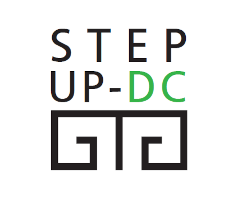Session 6.4, Pedagogies, teaching and assessment methods / Models of assessment for Democratic Citizenship: Assessment, self-assessment, evaluation and feedback
STEPUP-DC Project
Description

Course DescriptionDuration
The duration of the session is 9 hours (3 reading + 3 learning + 3 working/practicing)
Objectives
The objectives of this session are:
- Develop students’ confidence in leading initiatives and developing educational programmes for EDC/HRE/IE.
- Familiarise students with assessment on EDC/HRE/IE and the use of Council of Europe’s Framework for development of democratic culture in assessment and evaluation.
Basic Topics
- Assessment and evaluation
- Self-assessment
- Feedback
- RFCDC’c descriptors in assessment
Learning outcomes
On the completion of the session participants will be able to:
- define the concepts of assessment and evaluation.
- understand assessment and evaluation as an integral part of learning environments and processes which are related to Education for Democracy and Human Rights Education.
- design assessments for use in relation to the CDC (Competence for Democratic Culture) in order to empower learners as democratic citizens.
- respect the democratic assessment principles of validity, reliability, equity, transparency, and practicality and respectfulness.
Outcomes and CDC
- Knowledge and critical understanding
- Knowledge and critical understanding of the self
- 1805: Can reflect critically on his/her own values and beliefs (intermediate)
- 1807: Can reflect critically on how other people perceive him/her (intermediate / advanced)
- Values
- Valuing cultural diversity 202: Promotes the view that one should always strive for mutual understanding and meaningful dialogue between people and groups who are perceived to be “different” from one another (basic)
- Attitudes
- Openness to cultural otherness 407: Enjoys having discussions with people whose ideas and values are different from his/her own (intermediate / advanced)
- Respect 501: Gives space to others to express themselves (basic)
- Responsibility 701: Shows that he/she accepts responsibility for his/her actions (basic)
- Self-efficacy:
- 801: Expresses a belief in his/her own ability to understand issues (basic / intermediate)
- 806: Expresses a belief that he/she can undertake the actions required to achieve a goal (basic / intermediate)
- 813: Expresses a belief in his/her own ability to select appropriate methods for accomplishing tasks (intermediate)
- Skills
- Analytical and critical thinking skills
- 1110: Can make evaluations on the basis of evidence and experience (basic / intermediate)
- 1121: Can analyse evidence when evaluating an argument (intermediate)
- Flexibility and adaptability
- 1402: Can change the decisions that he/she has made if the consequences of those decisions show that this is required (basic)
- 1403: Adjusts way of working when this is necessary (basic)
Duration
The duration of the session is 9 hours (3 reading + 3 learning + 3 working/practicing)
Objectives
The objectives of this session are:
- Develop students’ confidence in leading initiatives and developing educational programmes for EDC/HRE/IE.
- Familiarise students with assessment on EDC/HRE/IE and the use of Council of Europe’s Framework for development of democratic culture in assessment and evaluation.
Basic Topics
- Assessment and evaluation
- Self-assessment
- Feedback
- RFCDC’c descriptors in assessment
Learning outcomes
On the completion of the session participants will be able to:
- define the concepts of assessment and evaluation.
- understand assessment and evaluation as an integral part of learning environments and processes which are related to Education for Democracy and Human Rights Education.
- design assessments for use in relation to the CDC (Competence for Democratic Culture) in order to empower learners as democratic citizens.
- respect the democratic assessment principles of validity, reliability, equity, transparency, and practicality and respectfulness.
Outcomes and CDC
- Knowledge and critical understanding
- Knowledge and critical understanding of the self
- 1805: Can reflect critically on his/her own values and beliefs (intermediate)
- 1807: Can reflect critically on how other people perceive him/her (intermediate / advanced)
- Knowledge and critical understanding of the self
- Values
- Valuing cultural diversity 202: Promotes the view that one should always strive for mutual understanding and meaningful dialogue between people and groups who are perceived to be “different” from one another (basic)
- Attitudes
- Openness to cultural otherness 407: Enjoys having discussions with people whose ideas and values are different from his/her own (intermediate / advanced)
- Respect 501: Gives space to others to express themselves (basic)
- Responsibility 701: Shows that he/she accepts responsibility for his/her actions (basic)
- Self-efficacy:
- 801: Expresses a belief in his/her own ability to understand issues (basic / intermediate)
- 806: Expresses a belief that he/she can undertake the actions required to achieve a goal (basic / intermediate)
- 813: Expresses a belief in his/her own ability to select appropriate methods for accomplishing tasks (intermediate)
- Skills
- Analytical and critical thinking skills
- 1110: Can make evaluations on the basis of evidence and experience (basic / intermediate)
- 1121: Can analyse evidence when evaluating an argument (intermediate)
- Flexibility and adaptability
- 1402: Can change the decisions that he/she has made if the consequences of those decisions show that this is required (basic)
- 1403: Adjusts way of working when this is necessary (basic)
- Analytical and critical thinking skills
